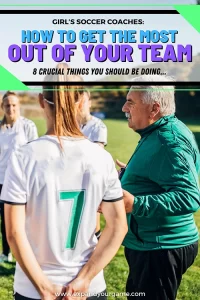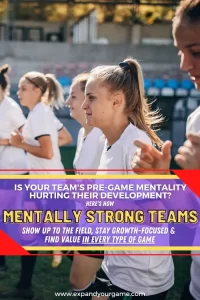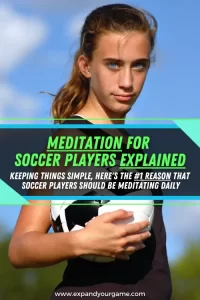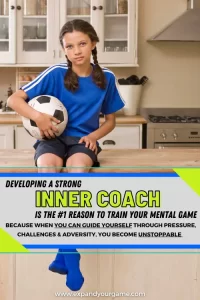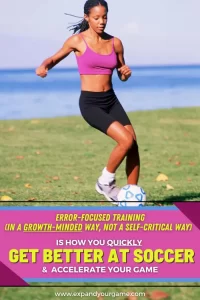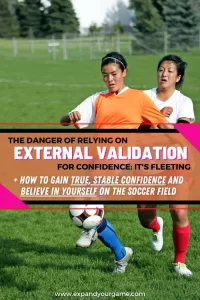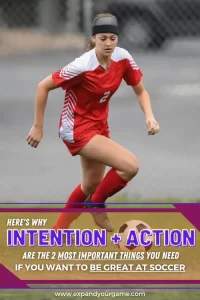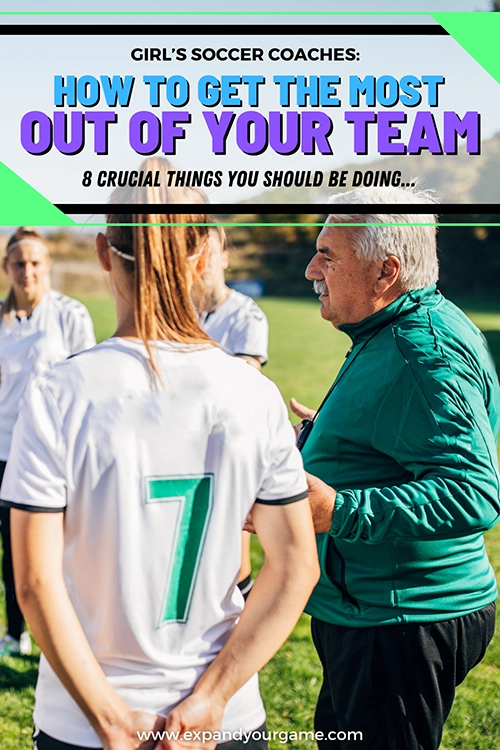
And let me tell you, it is good insight. Insight that has changed the way I coach on the field.
I don’t know any of your teams, any of the players, parents, or clubs, so everything here is general concepts/notions based off of recurring themes that I see show up for young women. I’m offering a look into how I help them (as individuals and teams) navigate the world of elite youth soccer, enhance their performance, and prioritize mental wellness.
This Post Contains:
#1 - Connect with players individually
Great soccer coaches understand that in order to get the best response from their players, and in turn the best results on the field, they have to connect with them individually as humans first and foremost.
This does NOT mean being soft. Coaches that get the BEST response and buy-in from female players are actually pretty tough on them and hold them accountable to improvement and meeting high standards. But, the reason this works is because they’ve made it a huge priority to connect with them as individual people. Great soccer coaches prioritize connecting first, person to person.
When we coaches do this, everything else we say has way more power. When we connect with them as people (before soccer players), they are way more likely to HEAR what we are saying and want to work hard to implement it. They are able to be more growth-minded, take feedback, and accelerate their growth. Players who feel seen as people are eager for information about how to improve, they can take honest harsher criticism, and they can coach themselves through moments of adversity on the field. All of this is because they know that behind everything their coach says is genuine care.
#2 - Help them separate results from worth
Great soccer coaches prioritize helping their soccer players establish a healthy relationship with the game.
Having a healthy relationship with the game means we still can be frustrated or upset about a loss, we just don’t associate it with our value and worth as a person. We use it as fuel to drive us to get up and go again.
#3 - Normalize the conversation
Great soccer coaches understand that pressure, expectations, self-doubt, and comparison culture are very real things in a teenage girl's world.
How we help them is by normalizing the conversation about the harder pieces of being an elite youth athlete. We acknowledge that adversity is 100% a part of this journey. We help players stop trying to hope that pressure and nerves will go away, and teach them that being at this level is about learning to exist WITH them and still perform.
We also need to help them understand that while having high expectations of themselves is a good thing, most of the things they probably think are high expectations are actually impossibly-high-unrealistic-expectations-of-perfection. And those ones AREN’T good. High expectations must be limited only to things we have complete control over. Movement, communication, ball striking in front of the net… those are parts of the game that we can have high expectations for. Scoring a goal every time you go in, NOT a high expectation because you don’t have full control over whether this happens or not…
Great coaches help players make these distinctions and regularly acknowledge that managing pressure is hard, but part of the work of an athlete.
#4 - Never shut up about mistakes being OK
Great soccer coaches consistently talk and talk and talk and talk about how mistakes are a part of the game.
We have to consistently talk about this because many young women (even if the team and home environment are both great) have been socially conditioned to believe that mistakes are not OK (and not just in soccer).
At this point, they don’t learn from their mistakes because they are tying their self-worth to their performance. They are defining who they are as person based off of their ability to NOT make mistakes and get stuck in a cycle of perpetually feeling inadequate. And, as a coach, you NEED them to learn from their mistakes so that you can get better as a team.
Grow your confidence through preparedness.
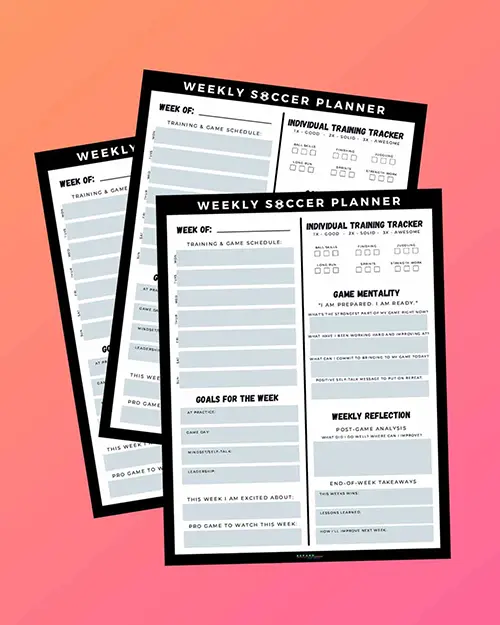
Subscribe to our email list to
Get your FREE Weekly Soccer Planner!
We respect your privacy. Unsubscribe anytime.
#5 - Redefine success beyond winning
Great soccer coaches establish a culture that includes TWO separate definitions of success that the team is always striving toward.
Success for me, the player, means: identifying what is controllable, what nobody can stop me from doing- and going out and giving maximum effort and energy toward those things. If I do that, THAT IS SUCCESS, regardless of the result. It is success because it is moving me toward that future version of myself that I want to be.
#6 - Stop telling them to get out of their head
Great soccer coaches don't just tell players to be more confident, get out of their head, stop overthinking, and stop hesitating... They provide them tangible tools & strategies.
- using intentional self-talk to coach ourselves through a hard moment
- neutral thinking, mastery experiences to deal with pre-game nerves
- read a super helpful book from someone who knows how to lock-in on demand
- use controllable objectives in your training sessions and games
#7 - Be steadfast about healthy team culture
Great soccer coaches have a really good understanding of the power of the collective.
Cliques will undermine all of the good things you are trying to teach them about soccer and will completely limit your team’s ability to maximize potential. Helping the girls understand this, that these actions are actually the source of their disconnected play and lead to underperforming as a team, is crucial if you want to be a good team. This cannot be an optional thing either, as it will destroy your team if you ignore it.
#8 - Prioritize the mental side of the game
Great soccer coaches teach their players that mental performance skills are crucial to gaining an edge on their competition. Because to be the best, they need to self-regulate and be in control of their thoughts, feelings and actions and NOT let whatever is going on in the environment control them.
And if you want to get the most out of your team, you have to set the tone for prioritizing this element of soccer by constantly incorporating it into your training and game plans.
Great Soccer coaches are human too
It can be difficult coaching at competitive and elite levels of youth sport. Absolutely. We all go through periods when we feel like nobody actually sees us, sees how much we care, or when our character is being misread and thrown under the bus. It’s also a struggle to balance all of the things that need to be done (session planning, video review, player evaluations, technical, tactical and physical training, etc.)
Great soccer coaches are not people who do all of the above perfectly. They are people who are self-aware enough to realize that they have faults of their own, and are growth-minded and just keep working to improve because they so passionately care about their players and their players’ growth. Not just as soccer players, but as human beings.
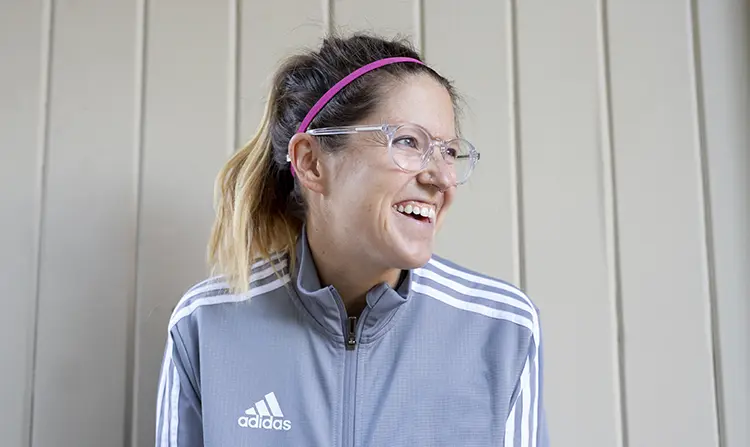
Hi everyone! I’m Jenn and I create content to help female soccer players and coaches maximize individual and team potential by developing healthy mindset skills. Join other subscribers and sign up for the newsletter for all my best tips and advice!
We respect your privacy. Unsubscribe anytime.

